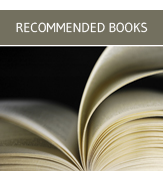In Case You Missed It Part 3 - A Selection of Recent Acquisitions
Another subjective selection of titles recently added to our collection (late fall and winter) that may not have received high-profile reviews or benefited from big promotion budgets, but that caught our eye. There are a lot of books included, but these are just the tip of the iceberg when it comes to new arrivals. To see additional recent books, check our monthly New Books lists, always available on our website (in the "Marginalia" column on the left of our home page) and at the Reference Desk.
Keep your eyes on this space for future lists. To see previous “In Case You Missed It” posts, click here and here. We also recently posted this annotated list of recent arrivals on African American history. To see more book recommendation articles on a wide range of subjects and genres, click here.
Jump to: FICTION, LITERATURE, NEW TRANSLATIONS | BELLES LETTRES, LITERARY CRITICISM, MEMOIRS | CRIME AND VICE | HISTORY | FINE & PERFORMING ARTS | POLITICS, ECONOMICS, CURRENT EVENTS | PHILOSOPHY | SCIENCE & NATURAL HISTORY | CHILDREN’S BOOKS
FICTION, LITERATURE, NEW TRANSLATIONS
Found in Translation: 100 of the Finest Short Stories Ever Translated | Frank Wynne, ed.
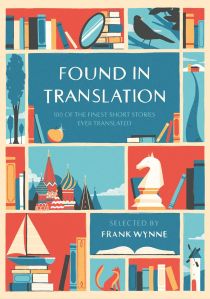
There are at least 100 reasons to pick up this anthology of short stories in translation. You might want to see what Frank Wynne, a noted translator of both French and Spanish (see Vernon Subutex below), selected to represent the literature of the world. Perhaps you’re interested in the other translators represented, who include in their number names like DH Lawrence and Edith Wharton. Most likely it will be for the new discoveries among the many authors you already know and love. It is a thankless task to try to pick only 100 things to represent the world’s literatures, but the TLS offers praise for “Wynne’s splendidly ecumenical anthology.”
Pan Tadeusz: The Last Foray in Lithuania | Adam Mickiewicz (translated from the Polish by Bill Johnston)
Pan Tadeusz is the national epic of Poland, and Mickiewicz is considered a national hero in Poland, Bealrus and Lithuania, yet his major work was hardly known here. Bill Johnston had quite a task on his hand when he began this translation, attempting to keep both the poetry (the original is in 13 syllable rhyming lines) and the plot of Mickiewicz work. By all accounts Johnston is quite successful. The Specatator says, “At last, English readers can grasp why Pan Tadeusz belongs with Byron’s Don Juan and Pushkin’s Eugene Onegin in a glorious farewell trio that marked the swansong of the verse epic in Europe.”
The Penguin Book of the Contemporary British Short Story | Philip Hensher, ed.
Anthologies of short stories are prevalent and unexceptional, save the rare one that is more than the sum of its stories. This collection, edited and introduced by Philip Hensher is just such a treat. The Spectator notes that it “is bigger, better and broader in several senses than anything else currently available,” while the Times goes further, saying, “sometimes—not often—a book comes along that feels like Christmas. A Santa's sack of goodies to be unwrapped, revealing ever more lovely treats. Philip Hensher's timely, but timeless, selection of the best short stories from the past 20 years is that kind of book. In fact, his introduction is as enriching as anything that has been published this year.”
Sorrow of the Earth: Buffalo Bill, Sitting Bull and the Tragedy of Show Business | Eric Vuillard (translated from the French by Ann Jefferson)
Vuillard's Order of the Day was a Society Library favorite last year. Member after member (staff, too) sung its praises upon returning it. Sorrow of the Earth is actually the first of his books to be published in English translation (by Pushkin Press), and it is a imaginative ficional invesigation of the Native Americans who were a part of Buffalo Bill's massive "Wild West Show." The TLS: "perhaps the shortest and most intense book on the Wild West ever published...the author imagines his way into the felt lives behind the pasteboard fronts: the inner thoughts and feelings of the performers...This is show business as cultural genocide."
Vernon Subutex trilogy (first two books translated by Frank Wynne) | Virgine Despentes
This trilogy’s titular character is a forty-nine-year-old former record store owner, an affable loser who “does not have the attention span to be truly depressed” and is trying to survive in 21st century Paris after being evicted from his apartment. In the TLS, Chris Kraus described the book as “part pulp fiction, part picaresque realism, hilariously tracing the dissolution of French civic life in the twenty-first century. But the pain felt by its actors is real and often heartrending…There are great lines on every page.” Despentes is a revered cult figure among feminists, well-known in France as a novelist and filmmaker for years. The translation of the first book in the trilogy was short-listed for the Man Booker International Prize in 2018.
What's Left of the Night | Ersi Sotiropoulos (translated from the Greek by Karen Emmerich)
A fictionalized portrait of a young C.P. Cavafy, one of the 20th century’s greatest poets, this novel takes place over three days in June 1897, when Cavafy arrives in Paris on the last stop of a long European tour. Sotiropoulos depicts Cavafy in the midst of a journey of self-discovery, by turns exhilarated and tormented by his homosexuality. Originally published in 2015 in Greece where it won several literary awards, the English translation of What’s Left of the Night was well-reviewed in the TLS (“a remarkable novel”), Publisher’s Weekly, the Los Angeles Review of Books (“Sotiropoulos’s prose strikes a chord of dark beauty, visceral grossness, and ironic humor indistinguishable from the experience of reading Cavafy’s poetry”), the Wall Street Journal (“as sensual as it is erudite, a stirringly intimate exploration of the private, earthy place where creation commences”), and elsewhere.
Arturo's Island | Elsa Morante (translated from the Italian by Ann Goldstein)
Elsa Morante first published this novel in 1957, and it won her the Premio Strega, a major Italian literary prize. This new translation is by Ann Goldstein, acclaimed for her work on Elena Ferrante and Primo Levi.
BELLES LETTRES, LITERARY CRITICISM, MEMOIR
After Emily: Two Remarkable Women and the Legacy of America's Greatest Poet | Julie Dobrow
Debate continues over the ways in which Mabel Loomis Todd and her daughter, Millicent Todd Bingham, edited and compiled the thousand-plus Emily Dickinson poems that were discovered after her death. In this book, Julie Dobrow presents new research that sheds light on their efforts. “Dobrow's intimate portrait of these artistically talented and intelligent women, based largely on their extensive, detailed diaries and correspondence, reveals fallible women who painstakingly attempted to share an extraordinary poet's vision… often through intuitive and savvy marketing (Booklist).” Publisher’s Weekly called the book “authoritative” and “Impeccably researched using more than 700 boxes of the Todds' personal documents.”
Between Two Millstones, book 1: Sketches of Exile, 1974-1978 | Aleksandr Solzhenitsyn (translated from the Russian by Peter Constantine)
Solzhenitsyn’s memoir—a successor to The Oak and the Calf—begins on February 12, 1974, when he was forcibly expelled to Frankfurt, West Germany, as a result of the publication of The Gulag Archipelago. The book contains vivid descriptions of Solzhenitsyn's journeys to various European countries and North American locales while he was arguably the most famous writer in the world. “It is distinguished by Solzhenitsyn’s descriptions of the initial pain of exile, his bristling reactions to Western mores, and his search for a quiet place to finish his work and live out his life.”—The New Yorker
Books are Made Out of Books: a Guide to Cormac McCarthy's Literary Influences | Michael Lynn Crews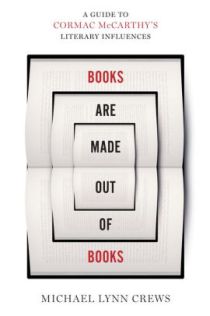
Crews digs deep into McCarthy's manuscript collection in the Texas State archives to examine the traces, notes, and clues McCarthy left behind about what he was reading while writing his novels, and how the reading influenced him. Crews offers sharp critical readings of McCarthy’s work, and as an exploration into how others’ books can inspire and influence a writer (and be pillaged for occasional creative thievery), this is a fascinating and revealing study. McCarthy reads widely, so the book also offers quality grist for future reading lists. If you are a McCarthy admirer this is a must-read.
Dear Mr. Murray: Letters to a Gentleman Publisher | David McClay, ed.
The publishing house of John Murray was founded in Fleet Street in 1768. Dear Mr. Murray is an entertaining and revealing collection of some of the best letters from the hundreds of thousands held in the company’s archive: Charles Darwin's response to negative reviews; Adrian Conan Doyle challenging Harold Nicolson to a duel; William Makepeace Thackeray apologizing for his drunken behavior; plus, letters from Byron, James Hogg, Jane Austen, Patrick Leigh Fermor, and many more.
Facing the Abyss: American Literature and Culture in the 1940s | George Hutchinson
This wide-ranging book examines how literature revealed American attitudes about patriotism, race, war, ethnicity, religion, gender, and ecology in the 1940s. The reviews mention an impressive variety of authors touched on by Hutchinson (Cornell University): Gertrude Stein, Chester Himes, Anne Petry, Saul Bellow, Tennessee Williams, Carson McCullers, Randall Jarrell, Richard Wright, and many more—canonical, popular, and forgotten. The reviewer in Kirkus notes that “Hutchinson appears to have read everything written during the prolific decade.” Read a New York Review of Books assessment of the book here.
It’s Alive! A Visual History of Frankenstein | Elizabeth Campbell Denlinger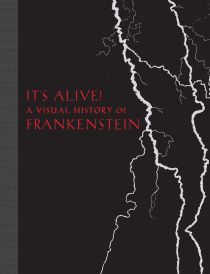
This beautiful, copiously-illustrated, catalog accompanies an exhibit at the Morgan Library & Museum commemorating the two-hundredth anniversary of Mary Shelley’s Frankenstein. The book and the exhibit trace the origins and impact of the classic, influential novel. Elizabeth Denlinger is curator of The New York Public Library’s Carl H. Pforzheimer Collection of Shelley and His Circle.
Letters to a Young Painter | Rainer Maria Rilke (translated by Damion Searls)
Rilke’s letter writing prowess is well-known, but the letters to (a teenaged) Balthus collected here, dating from 1920 to 1926, have not been previously translated into English.
Looking For Lorraine: The Radiant and Radical Life of Lorraine Hansberry | Imani Perry
Best-known for writing the hit play A Raisin in the Sun, Lorraine Hansberry’s short life (she died at 34), was full of extraordinary experiences and achievements. She was committed to social justice, and her circle of close friends included James Baldwin and Nina Simone. Biographer Imani Perry is a Professor of African American Studies at Princeton University, and her “ardent, expert, and redefining work of biographical discovery brings light, warmth, scope, and enlightening complexity to the spine-straightening story of a brilliant, courageous, seminal, and essential American writer” (Booklist).
The Portable Nineteenth-Century African American Women Writers | General Editor, Henry Louis Gates, Jr.
Penguin Classics presents “the most comprehensive anthology of its kind…featuring work from forty-nine writers arranged into sections of memoir, poetry, and essays on feminism, education, and the legacy of African American women writers.”
Rediscovering Forgotten Radicals: British Women Writers, 1889-1939 | Angela Ingram & Daphne Patai, eds.
Choice: “The focus of these 13 essays is on radical women writers whose work during a 50-year period dealt with social issues such as marriage, socialism, votes for women, their reproductive rights, eugenics, war, and the rise of the Nazis…. A well-conceived and amply documented book.”
Skybound: A Journey in Flight | Rebecca Loncraine
If you long for the freedom of flight, you may find no better companion than this book. It’s the story of one woman learning to fly as an escape from her recent cancer treatment. The Literary Review says the book is “better even than Antoine de Saint-Exupéry’s Wind, Sand and Stars or Beryl Markham’s West with the Night” while the Guardian hails it as “a profound, euphoric, and courageous book.”
Welcome Home: A Memoir with Selected Photographs and Letters | Lucia Berlin (edited and with a foreword by Jeff Berlin)
After the surprise success in 2015 of Berlin’s selected story collection, A Manual for Cleaning Women¸ we now have two “new” Berlin books at the Library: Evening in Paradise: More Stories and Welcome Home. The latter was described by Patricia Lockwood in the London Review of Books as “…a little uncut ruby of a memoir that is appearing for the first time. Left unfinished when Berlin died in 2004, it is extended to a respectable length by a selection of letters, mostly to her friends Ed and Helene Dorn.” If you have read Berlin’s stories, the thought of a memoir is intriguing, to say the least. It is hard not to wonder what might have been had Berlin finished it, but this memoir does not disappoint.
Why Do I Write? An Exchange of Views Between Elizabeth Bowen, Graham Greene, V.S. Pritchett (Preface by V.S. Pritchett)
Published in 1948 in the UK, this slim volume is an exploration, composed via correspondence among the authors, into varous issues facing writers. Recently donated by a member, it is hard to believe we didn’t already own a collection that features three authors Library members have been drawn to for decades. We receive some excellent book donations from generous members, and this one is truly fascinating.
Writer’s Map: An Atlas of Imaginary Lands | Huw Lewis-Jones, ed.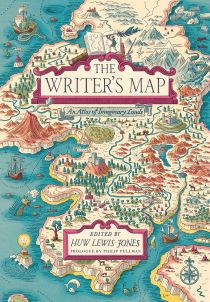
This atlas explores the maps that writers create and are inspired by—real and imagined—in 167 full-color images. Maps from adventure, science-fiction and fantasy novels, nursery rhymes, literary classics, comics, and more.
New York Review Books Classics
Several reissued titles have recently arrived courtesy of the reliable New York Review of Books publishing imprint. Click on the NYRB link after the title for more information.
- Lost time: Lectures on Proust in a Soviet Prison Camp | Józef Czapski (translated from the French by Eric Karpeles) NYRB
- Omer Pasha Latas | Ivo Andrić (translated from the Serbo-Croatian by Celia Hawkesworth; introduction by William T. Vollmann) NYRB
- Once and Forever: The Tales of Kenji Miyazawa (translated from the Japanese by John Bester) NYRB
- Portraits Without Frames | Lev Ozerov (edited by Robert Chandler & Boris Dralyuk ; translated by Maria Bloshteyn, et al.) NYRB
- Inhuman Land: Searching for the Truth in Soviet Russia 1941-1942 | Józef Czapski (translated from the Polish by Antonia Lloyd-Jones) NYRB
CRIME AND VICE
Milk of Paradise: A History of Opium | Lucy Inglis
Kirkus calls this “a sweeping, panoramic history of opium and its deep roots in a vast array of societies and cultures…a story that stretches across 5,000 years of history and touches nearly every part of human civilization” and explores the tensions between its medicinal values and its dangers. The Economist calls it a “deeply researched and captivating book” with “remarkable characters” and “exotic details.”
Murder by the Book: A Sensational Chapter in Victorian Crime | Claire Harman
Claire Harman is an acclaimed biographer of Robert Louis Stevenson, Jane Austen, Sylvia Townsend Warner, and Charlotte Bronte. In her latest, she examines the 1840 murder of Lord William Russell that sent London society reeling. In his confession, the murderer claimed to have been inspired by a popular novel by William Harrison Ainsworth called Jack Sheppard, and cited the lurid book in his defense. Harman combines this thrilling true-crime story with an illuminating account of the rise of the novel form and “tells the story with clarity and vigour” (the Guardian).
Lust on Trial: Censorship and the Rise of American Obscenity in the Age of Anthony Comstock | Amy Werbel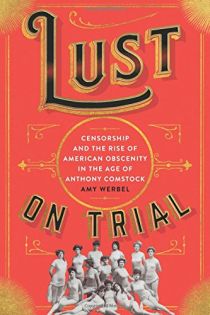
A detailed study of Anthony Comstock, the crusader against pornography in late nineteenth-century New York and his campaign to rid the city of all obscenity. Comstock was a sort of anti-smut vigilante (he held no government position), backed by rich, influential individuals like the YMCA and eventually the New York Society for the Suppression of Vice. Comstock and his supporters saw threats lurking everywhere: in the theater, fiction, art, postcards, beauty pageants, films, and more. Werbel chronicles his rise and fall in what the TLS describes as “a richly detailed, deeply researched and lavishly illustrated account of Comstock’s career and legacy.”
The Trial of Lizzie Borden | Cara Robertson
Historical true crime fans are sure to love this one. The author is a lawyer and legal scholar who devoted twenty years of research to analyze this famous and still-controversial murder in Fall River, Massachusetts, August, 1892. Publisher’s Weekly calls it the “definitive account…a superior, page-turning true crime narrative that will leave most readers believing that the jury got it wrong” and Booklist gave it a starred review. Recently unearthed evidence, 60 pages of footnotes—could this be the last word on Borden and that axe?
HISTORY
As a City on a Hill: The Story of America’s Most Famous Lay Sermon | Daniel T. Rodgers
"For we must consider that we shall be as a city upon a hill," John Winthrop warned his fellow Puritans at New England's founding in 1630. More than three centuries later, Ronald Reagan remade that passage into a celebration of American promise. How were Winthrop's words from a forgotten sermon reinvented as a statement of American identity and exceptionalism? Publisher’s Weekly: “Princeton historian Rodgers argues that the comparison of America to a city on a hill that politicians often use…is not true to the sermon's original sentiment and distorts the historical legacy of the passage… Rodgers tracks the text in references across time, with highlights including the novels of Herman Melville, letters from the trenches of WWI, Liberian colonists' writings, and finally a rejection of the sermon by 21st-century evangelical Protestants.”
City of a Million Dreams: a History of New Orleans at year 300 | Jason Berry
Published by University of North Carolina Press, this is “an evocative, character-driven narrative history of New Orleans, highlighting its multiculturalism, love of spectacle, and resilience through fires, floods, and wars… a multifaceted, detailed portrait of one of America's most unusual and culturally rich cities.”—Publisher’s Weekly
D-Day: The Soldiers Story | Giles Milton
Giles Milton is a prolific and bestselling British historian whose previous books include Nathaniel's Nutmeg and Churchill's Ministry of Ungentlemanly Warfare. The research for his latest book was drawn entirely from original source material: oral interviews, handwritten diaries and typescript accounts. Library Journal: “a refreshing portrayal of how the Allies prepared, fought, lost, and won on that fateful day in 1944…Milton has raised the bar for future histories of this pivotal event.”
A German Officer in Occupied Paris: War Journals, 1939-1945 | Ernst Junger (translated from the German by Thomas Hansen and Abby J. Hansen)
Ernst Junger made his name with his 1920 WWI memoir, Storm of Steel. He was a controversial figure during his long life and has remained so since his death at age 102 in 1998. According to a Financial Times review, this first translation of his WWII journals “shows the many sides of this complex, elusive writer.”
How to Behave Badly in Elizabethan England: A Guide for Knaves, Fools, Harlots, Cuckolds, Drunkards, Liars, Thieves, and Braggarts | Ruth Goodman
Publisher’s Weekly: “This entertaining, excellent book from Goodman (How to Be a Tudor) provides a window into the nitty-gritty of daily life for merchants, street sellers, and others listed in the subtitle in 1550–1660 England….Goodman’s scholarship is exemplary, and she sets the record straight on modern misperceptions of 16th- and 17th-century life…Accessible, fun, and historically accurate, this etiquette guide will yield chuckles, surprises, and a greater understanding of everyday life in Renaissance England.”
Mortal Republic: How Rome Fell into Tyranny | Edward Watts
Watts (Chair of the History Dept. at the University of California San Diego) looks at Rome's decline from representative government to corrupt empire from the second Punic War (218-02 BCE) to the end of the Republic. Watts argues that a close look at Rome can illuminate the current situation within the United States. “The classical world is often used as a lens through which to examine modernity…this trick can easily go awry; the past was not just the present in togas…But Mr. Watts pulls it off deftly” (Economist).
Power, Pleasure, and Profit: Insatiable Appetites from Machiavelli to Madison | David Wootton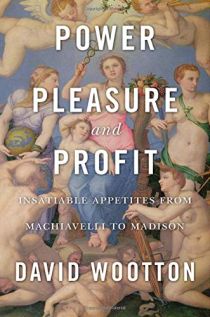
Published by Harvard University Press. “Enlightenment ethics [is] the focus of this book. Through the writings of great thinkers, Wootton describes the birth of a new concept of human nature during the years 1500 to 1800. This is heavy stuff, but readers expecting a turgid, scholarly tome need not worry… Throughout the narrative, Wootton demonstrates a consistent ability to make complex intellectual ideas approachable. Histories of ideas can be a snooze, but this is a surprisingly lucid examination of a dramatic revolution in human thought” (Kirkus).
Unexampled Courage: The Blinding of Sgt. Isaac Woodard and the Awakening of President Harry S. Truman and Judge J. Waties Waring | Richard Gergel
Gergel, a federal judge from South Carolina, argues that this rarely mentioned 1946 race-based crime altered officially sanctioned segregation of blacks, and influenced Truman’s decision to establish a commission to study the problem of civil rights and issue an executive order desegregating the military. “Gergel’s book is a revealing window into both the hideous racial violence and humiliation of segregation in the period immediately after World War II, and the heroic origins of the legal crusade to destroy Jim Crow… an engrossing history, animated by the stories of several key characters” (New York Times).
The War for the Common Soldier: How Men Thought, Fought, and Survived in Civil War Armies | Peter S. Carmichael
Carmichael builds his book around individual portraits of soldiers from the North and South and seeks to understand “the life of the rank and file as it was lived.” In the Wall Street Journal, Drew Gilpin Faust writes that “The greatest strength and appeal of the book lies in these glimpses of men endeavoring to cope with the ‘laborious work’ that is war. Their voices, often in awkward, misspelled—but by that very token all the more eloquent—prose, invite us into their almost unimaginable experience in the ‘vast and destructive war machine.’”
What Would Mrs. Astor Do?: The Essential Guide to the Manners and Mores of the Gilded Age I Cecelia Tichi
“A crisp survey of New York's upper-class world in the late 19th century, using society maven Caroline Astor as the guide….Gilded Age rules for proper behavior in everything from managing servants to choosing appropriate outfits. Tichi also delves into how the upper crust spent its time: on shopping, dining, traveling, entertainment, and various leisure activities” (Publisher’s Weekly).
FINE & PERFORMING ARTS
Notes and Methods | Hilma af Klint (Christine Burgin, ed.)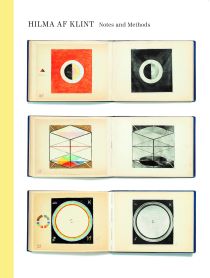
Published while the city is still buzzing about the recent Guggenheim exhibition, “Hilma af Klint: Painting for the Future” (and waiting on long lines to see it), Notes and Methods presents facsimile reproductions of af Klint’s early notebooks accompanied by the first English translation of her extensive writings in a lovely book. Also available at the Library: the impressive catalog that accompanies the Guggenheim exhibition.
Conversations with Film-makers: Movie Journal Columns 1961-1975 | Jonas Mekas
It is difficult to overstate the extent of Jonas Mekas’s influence on the world of film and post-war art and culture in general. Mekas, who died in 2019 at age 96, was the founder of New York’s invaluable Anthology Film Archives and the journal Film Culture, and “few would argue that Mr. Mekas, who was often called the godfather or the guru of the New American Cinema, was the leading champion of the kind of film that doesn’t show at the multiplex” (New York Times). This collection reprints interviews from the Village Voice with Andy Warhol, Stan Brakhage, Susan Sontag, John Cassavetes, Kenneth Anger, Shirley Clarke, Albert and David Maysles, Anna Karina, and others. Mekas did his last interview with the Guardian, and that can be read here.
Stones to Stains: The Drawings of Victor Hugo
In addition to being a major writer, Hugo was also “an accomplished and groundbreaking visual artist, though underrecognized during his lifetime” (Artforum). These drawings were created during his time in exile (1852-1870) and are beautiful, brooding, haunting things, produced in a wide range of media (pen, ink wash, graphite, crayon, charcoal, watercolor, more). Not to be missed.
In an exemplary cultural history of 1960s New York below 14th Street, McLeod corrals a sprawling cast of characters from the worlds of rock and roll, film, Warhol’s factory, drag queens, poets, hippies, off-off Broadway theatre, dive bars, and more to show how these scenes overlapped and influenced each other. McLeod’s research is prodigious, but he deploys it with a light touch.
An American Odyssey: The Life and Work of Romare Bearden | Mary Schmidt Campbell
Mary Schmidt Campbell drew on interviews with Bearden (1911-1988), as well as archival material, to write a major biography that chronicles his career from the 1930s as a Diego Rivera-inspired painter in Harlem to his abstract collages of the 1960s. Bearden’s work and life spans across significant shifts in 20th-century art and politics, and his friends and collaborators included Alvin Ailey, Ralph Ellison, and Albert Murray. “By navigating the historical, social, and political contexts informing black aesthetics and Bearden's unique oeuvre, Campbell has produced an invaluable work” (Booklist).
Forms of Enchantment: Writings on Art and Artists | Marina Warner
In a collection that spans over thirty years, “Warner brings her capacious knowledge of myth, fairy tale, aesthetics, religion, and literature to these erudite and luminous essays on art and artists” (Kirkus). Warner is a renowned scholar of fairy tale and myths, and the author of many acclaimed works.
I Too Sing America: The Harlem Renaissance at 100 | Wil Haygood, et. al
I Too Sing America is published in conjunction with a major exhibition at the Columbus Museum of Art and offers a generously illustrated chronicle of the lives of the people, art, literature, music, and social history of the Harlem Renaissance. Curator and editor Haygood has written several acclaimed books of African American history and biography.
Lament from Epirus: An Odyssey into Europe's Oldest Surviving Folk Music | Christoper C. King
Epirus straddles southern Albania and northwestern Greece, with a folk tradition extending back to the pre-Homeric era. Christopher King is a 78rpm record collector, a master compiler, Grammy-winning sound technician, and one of our most articulate explorers of the raw, rural sounds found on old records from around the world. Discovering the music of Epirus in a junk shop leads to an obsessive quest for its origins and to address "a larger enigma: why we make music." Lament from Epirus received excellent notices, and wound up on more than a few best-of-2018 lists. Read an interview with the author here.
Moved to Tears | Rebecca Bedell
Rebecca Bedell is Associate Professor of Art at Wellesley College, and describes her book as an effort to “uproot the still tenacious modernist prejudice against sentimental art and to transform our understanding of it, redefining and complicating ideas about what sentimental art looks like, who made it, and the cultural work it does. Key figures in the book include John Singer Sargent, Mary Cassatt, Henry Ossawa Tanner, Winslow Homer, George Inness, and John Trumbull.” Generously illustrated, and published by Princeton University Press.
Music as an Art | Roger Scruton
Recommended in several reviews for “informed/serious” readers, prolific author (and conservative hero in the UK) Scruton analyzes the work of Schubert, Rachmaninoff, Britten, and Rameau, opera and film scores, and more. Scruton explores how we can develop greater judgement in music, recognize both good taste and bad, and establish musical values, as well as musical pleasures. The author also examines the place of classical music in the world today.
POLITICS, ECONOMICS, CURRENT EVENTS
Money and Government: The Past and Future of Economics | Robert Skidelsky
Skidelsky (professor of political economy at Warwick University) has written several books about John Maynard Keynes—most notably a three-volume biography—and in his latest “aims to reintroduce Keynes’s central insights to a new generation of economists, and embolden them to return money and government to the starring roles in the economic drama that they deserve.” A reviewer in Foreign Affairs notes that Skidelsky’s “interpretations of Keynes’ thought are especially subtle” and he “offers an illuminating treatment of the 2008 financial crisis.”
Great Economic Thinkers: An Introduction - From Adam Smith to Amartya Sen | Jonathan Conlin, ed.
If you are having difficulties keeping Sen from Stiglitz, Hayek from Friedman, Schumpter from Keynes, “invisible hand” from “creative destruction,” this book is for you. Conlin offers an introduction to the lives and works of thirteen influential economists. The jacket copy promises it to be “free from confusing jargon and equations, describing and discussing key economic concepts.”
How Fascism Works: The Politics of Us and Them | Jason Stanley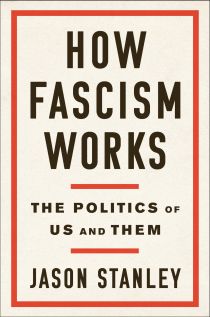
Jason Stanley (Yale University) provides “a fascinating breakdown of the fascist ideology, nimbly interweaving examples from Germany, Italy and Hungary, from Rwanda and Myanmar to Serbia and, yes, the US” (the Guardian). Publisher’s Weekly praises this “instructive and poignant examination of fascism in a cogent and accessibly written book.”
Chroniques: Selected Columns, 2010-2016 | Kamel Daoud (translated from the French)
Daoud is an Algerian writer whose debut novel The Meursault Investigation won the Goncourt Prize for a First Novel in 2013, and was very popular here at the Library. Choniques presents a selection of commentary originally published from 2010 to 2016. Opinionated and controversial (Daoud has many detractors), the columns gathered here are “incisive, occasionally witty and always irreverent, Daoud’s pen spares no one, not the Algerian state, or Islamists, or Arab nationalism, or far-right populism in Europe" (the TLS).
The Republican Reversal: Conservatives and the Environment from Nixon to Trump | James Morton Turner and Andrew C. Isenberg.
It is an overlooked fact that many environmental regulations in the U.S. were actually championed by Republicans: President Richard Nixon established the Environmental Protection Agency in 1970, and the Clean Air Act (1970), Clean Water Act (1972), and Endangered Species Act (1973) were all passed without a single dissenting vote in the Senate. Even Senator Barry Goldwater cosponsored the bill that became the Clean Air Act. The Republican Reversal chronicles the Republican party’s transformation on environmental issues over the last several decades.
PHILOSOPHY
I am Dynamite!: A Life of Nietzsche | Sue Prideaux
We see a lot of biographies about Nietzsche, but the reviews of Prideaux’s work have been exceptional. “… Wonderfully gripping—the type you stay in bed all Sunday just to finish,” says The Irish Times, while the Spectator described it as “excellently researched and compulsively readable…[with] the most evocative re-telling anywhere of the central passage of Nietzsche’s life, his friendship with Richard Wagner.” The NY Times: “Nietzsche steps out of the mists of obfuscation and rumor, vividly evoked …Prideaux draws her subject into focus by examining the events in his life, his personal writing and his published work.”
Classic Philosophical Arguments Series
A new series from Cambridge University Press examining arguments that have been a crucial, lasting presence in philosophical enquiry.
- The Brain in a Vat | Sanford C. Goldberg, ed.
- Ontological Arguments | Graham Oppy, ed.
- The Original Position | Timothy Hinton, ed.
- Pascal's Wager | Paul Bartha, Lawrence Pasternack, ed.
The Essential Mary Midgley | Mary Midgley
Midgley (1919-2018) was “an important writer on ethics, the relations of humans and animals, our tendency to misconstrue science, and the role of myth and poetry” (the Guardian). Her works were known for clarity and accessibility, and for their passionate critiques of atomist and reductive approaches to philosophical problems. Her challenges to scientists like Edward O. Wilson and, especially, Richard Dawkins (of The Selfish Gene) were well-known. This career-spanning book collects the very best of her work and serves as a fine introduction. Read her NY Times obituary here and a 2008 interview here.
SCIENCE & NATURAL HISTORY
Time Song: Searching for Doggerland | Julia Blackburn
Julia Blackburn has created an odd sort of thing with Time Song— a travel book for a place that no longer really exists. Or rather, a place that exists, but that one cannot easily travel to. Doggerland is the name of the land that used to connect the east coast of England to the rest of the continent, but that was drowned at the end of the Ice Age. Evidence of it is abundant, and it’s that evidence that informs Blackburn’s meditation on the past and how it interacts with the present. The Literary Review declares it “breathtaking,” and celebrates “the intelligence, the appetite for discovery and the shining imagination that have gone into it.”
The Book of Snakes: A Life-Size Guide to 600 Species from Around the World | Mark O’Shea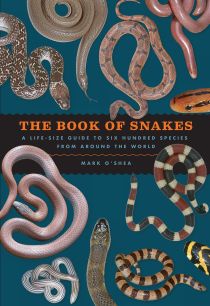
This is a stunning book, filled with vivid color photographs. Its publisher (University of Chicago Press) claims this is “the first book on these creatures that combines a broad, worldwide sample with full-color, life-size accounts.” The text is written for laypeople and includes a glossary of frequently used terms.
How Plants Work: Form, Diversity, Survival | Stephen Blackmore, ed.
From Princeton University Press, a large-format, heavily illustrated look at the wide adaptability and rich diversity of the plant kingdom.
CHILDREN’S BOOKS
Flying Colors | Robert G. Fresson
Vexillology, or, the study of flags, is the focus of this brightly colored and engaging guide by flag and map enthusiast Robert G. Fresson. Through the exploration of flags’ colors and symbols much can be discovered about the histories of the countries they represent. This well-illustrated guide is friendly and informative in its approach to facts regarding patterns, crests, symbolism, and the changes countries and their flags experience over time.
Crown: An Ode to the Fresh Cut | Derrick Barnes, with illustrations by Gordon C. James
Paying tribute to a weekly trip to the barber shop, this book won numerous awards for both its words and pictures. These accolades are well-deserved. From page one, the author and illustrator transport you inside this everyday event, even if it’s outside your daily experience. (For instance, I cut my own hair every 2 months or so!) The broad stroke paintings bring to life the various moments depicted in the text which is bursting with the pride from receiving a freshly coiffed ‘do. We encourage you to check out this sweet glimpse into an everyday experience.
The Belles, Book 1 | Dhonielle Clayton 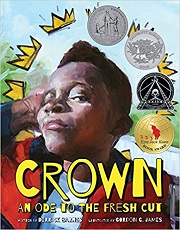
The first in a duology, The Belles takes readers inside a fantastical science fiction world where beauty is maintained by a royal court of sisters who have the power to manipulate skin tone, hair color, body shape, and more. There is poison brewing at the palace in the guise of a devious princess and the central character Camellia struggles between following the orders handed down or her own conscience. Consider yourself warned: once you pick up this book, it’s hard to put it down until you’re finished and there’s a strong cliffhanger—but the sequel, The Everlasting Rose, is coming soon! Check book one out today, so you’ll be ready to race to the end of the story later this year.
Miss Ellicott’s School for the Magically Minded | Sage Blackwood
If you loved the Harry Potter series (or aren’t quite ready for it!) and you’re caught up on all the Chrestomanci books, it’s time to meet a brave and clever young sorceress-in-training. Chantel is a gifted student at Miss Ellicott’s School for Magical Maidens, except in the one class most prized by Miss Ellicott: deportment. Chantel’s spirited behavior and innate magical talent may not be prized by her teachers or the city patriarchs, but because of her refusal to obey the rules, Chantel may be the Kingdom’s best hope when Miss Ellicott and all the other sorceresses disappear, allowing the return of the Marauders. Join Chantel as she embarks on a dangerous journey to find the missing sorceresses and transform the city of Lightning Pass. Other magical works by the author include the popular and acclaimed Jinx trilogy.
